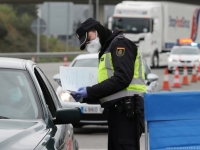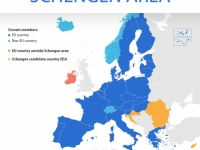Travel
Border controls in Schengen due to coronavirus: what can the EU do?
EU countries are relaxing controls
USPA NEWS -
Travelling freely in the EU was until two months ago a given for most Europeans, but restrictions introduced to halt the spread of the coronavirus meant the closing of internal borders in most parts of Europe. As the epidemiological situation improves and with the summer holidays in sight, countries are gradually restoring freedom of movement. European Parliament demand that the passport-free Schengen zone returns to its full functioning as soon as possible.
“Member States were acting alone and it is now high time the EU steps in before it is too late and irreparable damage to Schengen has been done,“ said MEP Tanja Fajon, the chair of the civil liberties committee's working group on Schengen scrutiny. “The Commission should take on a key role in restoring freedom of movement and firstly for crucial categories such as cross-border workers. European coordination is therefore essential,“ she added.
According to the current Schengen rules, EU countries can - for a limited period - introduce border checks at their internal borders if there is a serious threat to public policy or internal security. They must notify the European commission of such closures. The Commission currently keeps an overview of national Covid-19 restriction measures by country.
How to reopen borders
In a package of proposals to enable travelling to resume safely in the EU, the Commission proposed on May 13 to countries that are part of the Schengen zone to gradually reopen their internal borders. The emphasis is on coordination and respect of common criteria based on guidance by the European Centre for Disease Prevention and Control.The phased system of lifting restrictions could start between regions or countries with similar epidemic levels, but there should be no discrimination based on nationality, according the EP. The goal is to eventually open all borders throughout the EU to allow for smooth and safe travel for both professional and personal reasons. However, there is no set timetable as it depends on the epidemiological situation and member state decisions.
Border management and reintroduction of controls is a member state prerogative, but since the outbreak of the pandemic, the Commission has been facilitating common guidelines to make sure that workers in critical sectors as well as deliveries of goods and services in the single market are guaranteed. “It also facilitated the repatriations of almost 600,000 Europeans stranded abroad and proposed restricting entry of non-EU nationals into the EU, with an extension until 15 June.
MEPs are pressing for the restoration of borderless free movement for people, goods and services in the Schengen area. They want stronger EU cooperation to guarantee that there is no discrimination against any EU citizen. In a debate on the state of Schengen by the civil liberties committee on May 12, the Slovenian social democrat Tanja Fajon recalled the closures introduced in the midst of the migration crisis in 2015. Some countries maintained those controls for years, which Parliament criticised as unjustified.
“If we fail to restore the integrity of Schengen, we would seriously endanger the European project,“ Fajon said. MEPs therefore want to ensure that any future internal borders controls remain truly exceptional and very limited in time. The civil liberties committee is preparing a resolution on the situation in the Schengen zone, which MEPs are likely to vote on during June's plenary session.
Liability for this article lies with the author, who also holds the copyright. Editorial content from USPA may be quoted on other websites as long as the quote comprises no more than 5% of the entire text, is marked as such and the source is named (via hyperlink).







